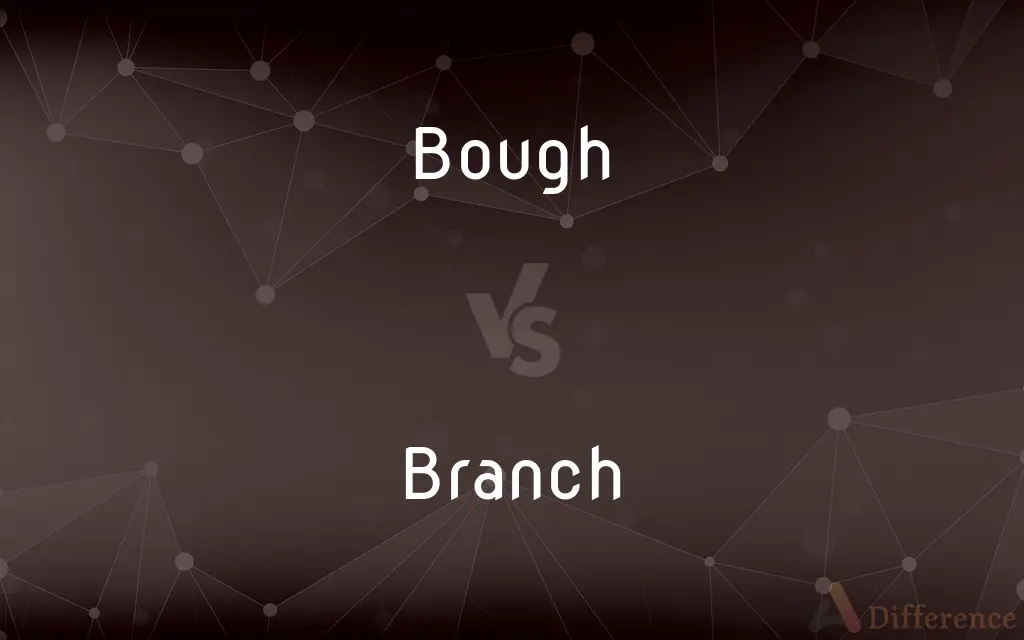Bough vs. Branch — What's the Difference?
By Tayyaba Rehman & Fiza Rafique — Updated on March 28, 2024
A bough is a large, main branch of a tree, significant in size and structure, whereas a branch can be any secondary offshoot from the tree's main trunk.

Difference Between Bough and Branch
Table of Contents
ADVERTISEMENT
Key Differences
A bough is characterized by its substantial size and strength, serving as a major support structure for a tree. It typically extends directly from the trunk, providing a primary framework for the tree's overall shape and stability. Whereas a branch, although it may vary in size, generally refers to any of the smaller limbs growing out from either the trunk or any bough, contributing to the tree's foliage and fruit production.
Boughs are integral to the tree's architecture, often bearing the weight of numerous branches, leaves, and sometimes fruit. They are fewer in number but critical for the tree's skeletal structure. On the other hand, branches are more numerous, ranging from thick extensions similar to boughs to thinner twigs at the tree's periphery, playing a vital role in photosynthesis and the tree's aesthetic appeal.
The term "bough" conveys a sense of majesty and strength, often associated with the main limbs of large, venerable trees. In literature and poetry, boughs symbolize shelter and robustness. Whereas branches, with their varied sizes and purposes, symbolize growth and diversity, illustrating the tree's life and vitality through their sprawling reach.
When it comes to pruning or tree maintenance, boughs require careful consideration due to their impact on the tree's health and shape. Removing a bough can significantly alter the tree's structure. Conversely, pruning branches is a more common practice, aimed at encouraging healthy growth and maintaining the tree's appearance.
In ecosystem dynamics, boughs play a crucial role in providing habitat and support for various organisms, from birds to epiphytic plants. Branches, while also serving as habitat, primarily function in the tree's physiological processes, such as light capture for photosynthesis and air exchange.
ADVERTISEMENT
Comparison Chart
Definition
A large and main branch of a tree
Any secondary offshoot from the tree’s trunk or boughs
Size
Large and substantial
Varies from small to large
Role in Tree
Structural support, major framework
Photosynthesis, growth, aesthetic appeal
Symbolism
Majesty, shelter, robustness
Growth, diversity, vitality
Maintenance
Requires careful consideration, impacts tree structure
Commonly pruned for health and appearance
Compare with Definitions
Bough
Often used symbolically to represent strength or shelter.
They found refuge under the sturdy bough of a willow.
Branch
A secondary limb growing from a tree's trunk or bough.
The tree branch swayed gently in the breeze, laden with blossoms.
Bough
Subject to specific pruning strategies due to their importance.
The arborist carefully assessed which boughs needed trimming to preserve the tree's health.
Branch
Pruned more frequently to shape the tree or remove unhealthy limbs.
Regular pruning kept the tree's branches healthy and well-shaped.
Bough
Can be an indicator of a tree's age and health.
The boughs of the centuries-old tree were thick and gnarled.
Branch
Integral to the tree's physiological processes, like photosynthesis.
Each branch was covered in leaves, capturing sunlight for the tree.
Bough
A major branch of a tree, especially one of the larger or main branches.
The oak's ancient boughs stretched skyward, forming a dense canopy.
Branch
Can also provide habitat, though typically for smaller creatures.
Insects and small birds thrived among the tree's numerous branches.
Bough
Provides habitat and support for various organisms.
The tree's boughs were home to nesting birds and climbing vines.
Branch
Varies greatly in size and function within the tree.
From the stout lower branches to the slender twigs above, each played a role in the tree's life.
Bough
Bough is a surname.
Branch
A tributary of a river.
Bough
A main branch of a tree
Apple boughs laden with blossom
Branch
Chiefly Southern US See creek. See Note at run.
Bough
A tree branch, especially a large or main branch.
Branch
A branch (UK: or UK: , US: ) or tree branch (sometimes referred to in botany as a ramus) is a woody structural member connected to but not part of the central trunk of a tree (or sometimes a shrub). Large branches are known as boughs and small branches are known as twigs.
Bough
A tree-branch, usually a primary one directly attached to the trunk.
Branch
A part of a tree which grows out from the trunk or from a bough
Sophie was in the branches of a tree eating an apple
Bough
A gallows.
Branch
(of a road or path) divide into one or more subdivisions
Follow this track south until it branches into two
Bough
An arm or branch of a tree, esp. a large arm or main branch.
Branch
(of a tree or plant) bear or send out branches
This rose has a tendency to branch and spread at the top
The branching heads of large yellow daisies
Bough
A gallows.
Branch
A secondary woody stem or limb growing from the trunk or main stem of a tree or shrub or from another secondary limb.
Bough
Any of the larger branches of a tree
Branch
A lateral division or subdivision of certain other plant parts, such as a root or flower cluster.
Branch
A secondary outgrowth or subdivision of a main axis, such as the tine of a deer's antlers.
Branch
An area of specialized skill or knowledge, especially academic or vocational, that is related to but separate from other areas
The judicial branch of government.
The branch of medicine called neurology.
Branch
A division of a business or other organization.
Branch
A division of a family, categorized by descent from a particular ancestor.
Branch
(Linguistics) A subdivision of a family of languages, such as the Germanic branch of Indo-European.
Branch
A divergent section of a river, especially near the mouth.
Branch
(Mathematics) A part of a curve that is separated, as by discontinuities or extreme points.
Branch
A sequence of program instructions to which the normal sequence of instructions relinquishes control, depending on the value of certain variables.
Branch
The instructions executed as the result of such a passing of control.
Branch
(Chemistry) A bifurcation in a linear chain of atoms, especially in an organic molecule where isomeric hydrocarbon groups can vary in the location and number of these bifurcations of the carbon chain.
Branch
To put forth a branch or branches; spread by dividing.
Branch
To come forth as a branch or subdivision; develop or diverge from
An unpaved road that branches from the main road.
A theory that branches from an older system of ideas.
Branch
(Computers) To relinquish control to another set of instructions or another routine as a result of the presence of a branch.
Branch
To separate (something) into branches.
Branch
To embroider (something) with a design of foliage or flowers.
Branch
The woody part of a tree arising from the trunk and usually dividing.
Branch
Any of the parts of something that divides like the branch of a tree.
The branch of an antler, a chandelier, or a railway
Branch
A creek or stream which flows into a larger river.
Branch water
Branch
(geometry) One of the portions of a curve that extends outwards to an indefinitely great distance.
The branches of a hyperbola
Branch
A location of an organization with several locations.
Our main branch is downtown, and we have branches in all major suburbs.
Branch
A line of family descent, in distinction from some other line or lines from the same stock; any descendant in such a line.
The English branch of a family
Branch
(Mormonism) A local congregation of the LDS Church that is not large enough to form a ward; see Wikipedia article on ward in LDS church.
Branch
An area in business or of knowledge, research.
Branch
(nautical) A certificate given by Trinity House to a pilot qualified to take navigational control of a ship in British waters.
Branch
(computing) A sequence of code that is conditionally executed.
Branch
(computing) A group of related files in a source control system, including for example source code, build scripts, and media such as images.
Branch
(rail transport) A branch line.
Branch
(intransitive) To arise from the trunk or a larger branch of a tree.
Branch
(intransitive) To produce branches.
Branch
(ambitransitive) To (cause to) divide into separate parts or subdivisions.
Branch
To jump to a different location in a program, especially as the result of a conditional statement.
Branch
(transitive) To strip of branches.
Branch
To discipline (a union member) at a branch meeting.
Branch
A shoot or secondary stem growing from the main stem, or from a principal limb or bough of a tree or other plant.
Branch
Any division extending like a branch; any arm or part connected with the main body of thing; ramification; as, the branch of an antler; the branch of a chandelier; a branch of a river; a branch of a railway.
Most of the branches , or streams, were dried up.
Branch
Any member or part of a body or system; a distinct article; a section or subdivision; a department.
It is a branch and parcel of mine oath.
Branch
One of the portions of a curve that extends outwards to an indefinitely great distance; as, the branches of an hyperbola.
Branch
A line of family descent, in distinction from some other line or lines from the same stock; any descendant in such a line; as, the English branch of a family.
His father, a younger branch of the ancient stock.
Branch
A warrant or commission given to a pilot, authorizing him to pilot vessels in certain waters.
Branch
Diverging from, or tributary to, a main stock, line, way, theme, etc.; as, a branch vein; a branch road or line; a branch topic; a branch store.
Branch
To shoot or spread in branches; to separate into branches; to ramify.
Branch
To divide into separate parts or subdivision.
To branch out into a long disputation.
Branch
To divide as into branches; to make subordinate division in.
Branch
To adorn with needlework representing branches, flowers, or twigs.
The train whereof loose far behind her strayed,Branched with gold and pearl, most richly wrought.
Branch
An administrative division of some larger or more complex organization;
A branch of Congress
Branch
A division of a stem, or secondary stem arising from the main stem of a plant
Branch
A part of a forked or branching shape;
He broke off one of the branches
They took the south fork
Branch
A natural consequence of development
Branch
A stream or river connected to a larger one
Branch
Any projection that is thought to resemble an arm;
The arm of the record player
An arm of the sea
A branch of the sewer
Branch
Grow and send out branches or branch-like structures;
These plants ramify early and get to be very large
Branch
Divide into two or more branches so as to form a fork;
The road forks
Common Curiosities
How do branches differ from boughs in terms of function?
Branches play a key role in photosynthesis and growth, whereas boughs provide major structural support.
Why is it important to be cautious when pruning a bough?
Pruning a bough can significantly affect a tree's health and structural balance.
Are all branches suitable for pruning?
While most branches can be pruned, decisions should be based on their health, function, and impact on the tree's appearance.
How does the size of a branch affect its role in the tree?
The size influences its role in photosynthesis, support, and habitat provision, with larger branches often playing more critical roles.
What defines a bough on a tree?
A bough is defined as one of the large, main branches of a tree, crucial for its structural integrity.
What is the impact of removing a large branch from a tree?
Removing a large branch can affect the tree's health, growth patterns, and appearance.
Are branches considered less important than boughs?
While branches might be smaller, they are essential for the tree's physiological processes and overall health.
Can the removal of boughs harm a tree?
Yes, improper removal of boughs can lead to structural instability and health issues for the tree.
What symbolic meanings do boughs carry?
Boughs often symbolize strength, shelter, and resilience in literature and poetry.
Can a branch become a bough?
As a tree grows, some branches can become substantial enough to be considered boughs due to their size and importance.
Do boughs and branches serve the same ecological roles?
Both provide habitat but differ in the organisms they support, with boughs typically supporting larger organisms.
How do boughs contribute to a tree's overall shape?
Boughs form the primary framework of a tree, determining its silhouette and structural form.
How do branches contribute to a tree's aesthetic appeal?
Through their growth patterns and foliage, branches play a significant role in defining a tree's beauty and shape.
What types of organisms typically inhabit boughs?
Larger birds, mammals, and certain plants like mosses and ferns often inhabit boughs.
Why is the distinction between boughs and branches important?
Understanding the distinction helps in proper tree care, maintenance, and appreciation of their roles and functions.
Share Your Discovery

Previous Comparison
Cookery vs. Cooking
Next Comparison
Assumption vs. AssumeAuthor Spotlight
Written by
Tayyaba RehmanTayyaba Rehman is a distinguished writer, currently serving as a primary contributor to askdifference.com. As a researcher in semantics and etymology, Tayyaba's passion for the complexity of languages and their distinctions has found a perfect home on the platform. Tayyaba delves into the intricacies of language, distinguishing between commonly confused words and phrases, thereby providing clarity for readers worldwide.
Co-written by
Fiza RafiqueFiza Rafique is a skilled content writer at AskDifference.com, where she meticulously refines and enhances written pieces. Drawing from her vast editorial expertise, Fiza ensures clarity, accuracy, and precision in every article. Passionate about language, she continually seeks to elevate the quality of content for readers worldwide.














































